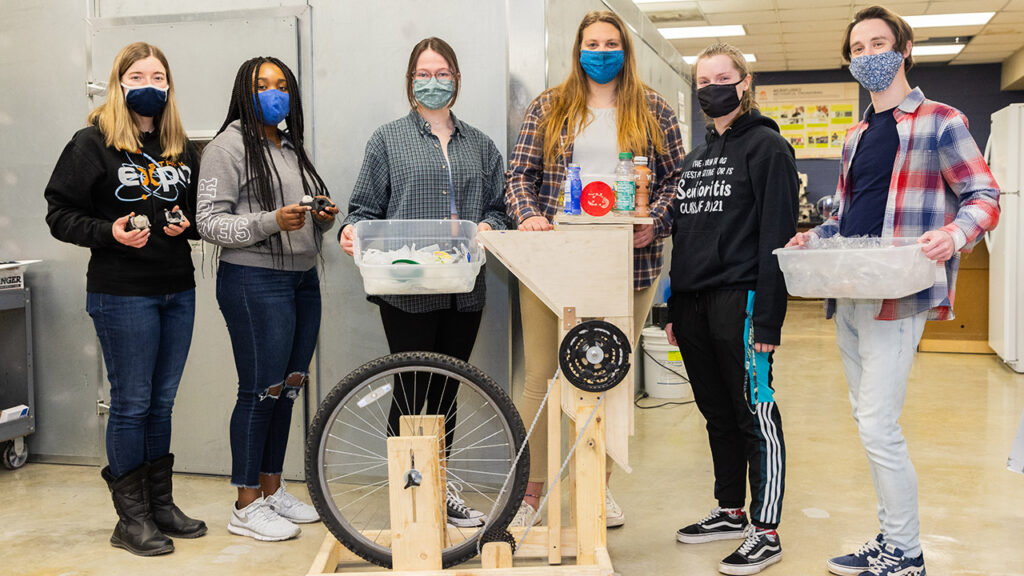
Pictured from left to right are Sydney Singer, Favour Butterfield, Olivia Schweiger, Mackenzie Darkow, JoJo Peplinski and Daniel Myers.
A group of mechanical engineering students at the University of Wisconsin-Platteville are tackling the growing problem of plastic waste in landfills by creating a way for anyone in any community to easily get involved in reusing and recycling plastic. They will present their research to legislators, local leaders and other members of the public at next month’s Research in the Rotunda event at the Capitol in Madison, Wisconsin.
Working with Dr. Jodi Prosise, chair of the Department of Mechanical and Industrial Engineering, the students’ research aims to create simple and affordable machines – that anyone can build – to increase recyclability. This includes a shredder, injection molder, sheet press and vacuum former.
“Our goal is to create an easy-to-understand manual, with as few words as possible – almost like what you would find with a LEGO set – so you don’t need to know a certain language to understand it and build the machines,” said Mackenzie Darkow, a senior mechanical engineering major from Hartland, Wisconsin.
Much of the team’s research has focused on ensuring the machines are able to be implemented in low-income regions and developing countries across the globe. Critical to the design of these machines is that they are simple to assemble and materials are accessible and inexpensive, so that any person in any community can implement them.
“We have been looking into developing countries and their resources and materials,” said Darkow. “Developing countries have drastically different materials than we do, so that’s why we have strayed away from using welding and most metals. A metal might be easy to find here but could be almost non-existent in another country.”
For this reason, Darkow said their designs are limited to rudimentary materials, such as wood and screws, as much as possible — a concept that runs counter to a lot of what they’ve learned as engineers.
“It’s been really fun but also tricky to find a solution,” said Darkow. “We’re taught to over-engineer, or make things as aesthetically pleasing as possible, but with this we are going to keep it as base-model as possible. We want some 15-year-old who wants to start shredding plastic in their garage to be able to do it.”
To accommodate the varying levels of users’ skill and access to materials and electricity, some of the machines are designed to be modular in how they are powered. The plastic shredder, for example, can be powered by a bike, hand crank, or motor. Once the team finishes prototyping and testing the machines, Darkow said she hopes they can be used on the UW-Platteville campus – not only to help reduce plastic waste but also to give future students the experience in working with recycled plastics.
“There is very little research on recycled plastic and its usage, so it would give students an opportunity to say they’ve worked with recycled materials, which most companies absolutely love to see,” said Darkow.
Darkow said she is looking forward to presenting the research at the Capitol, which will be her first opportunity to present her findings, after two-and-a-half years of working on this research.
“The biggest thing I want people to take away from this is that everyone thinks they have to make these big movements and changes in the system to reduce our plastic impact on campus,” she said. “I want people to see that plastic reduction can be done at a smaller scale at our universities. I’m sure there is a group of students at all the UW System universities that are willing to create a system to reuse our plastic. We’d love to be able to fully reduce plastic on campus, but we’d rather keep what we have on campus in order to teach students how to reuse it and create products we can give out.”
Additional student researchers who will present include JoJo Peplinski, Olivia Schweiger, Sydney Singer, Paul Jacobson, Dustin Pick and Daniel Myers. The 18th annual Research in the Rotunda event will be held on Wednesday, March 9. For more information, visit www.wisconsin.edu/research-in-the-rotunda/.
